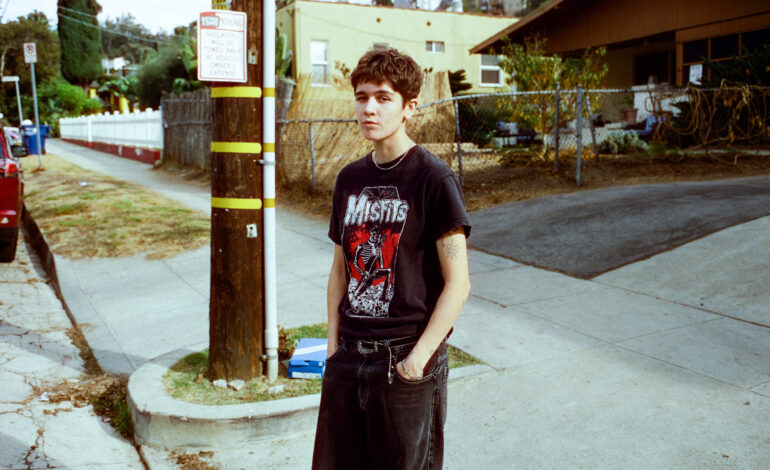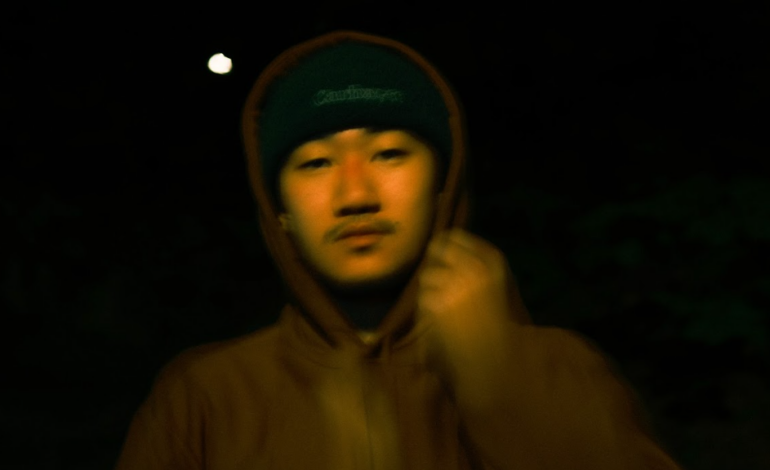Holy Death Temple isn’t here to save the world — they’re here to soundtrack its spectacular collapse. With their latest single “Survey Says,” the self-proclaimed “goth dance punk” trio distills existential dread, media-fueled rage, and digital chaos into a high-voltage anthem that feels like Family Feud hosted by the ghost of Guy Debord. In this interview, the band dives into the bleak brilliance behind their genre-defying sound, swapping traditional bass for sub-destroying synths, and why sometimes the best response to impending doom is to crank the BPM, hit the floor, and sing along like it’s the end of the world.
What inspired the concept behind “Survey Says,” especially the metaphor of social collapse as a rigged game show?
I wanted to write the ultimate nihilist party anthem. When the “Survey Says” line came to me, the next step was creating that world using Family Feud game show terms to show how we’re polarized by media and politics for profit. “Have you heard the news?” is a reference to rage bait and fearmongering content used to drive higher engagement and show people more ads.
How did the band’s background, particularly your time in a post-hardcore band, influence the sound and attitude of Holy Death Temple?
Bumming people out is not very fulfilling. The goal and process are totally different now. It’s coming from the same place, with the same intensity, but it’s more self-aware, and we’re all in on the joke. I write the songs pretending we’re playing them live, getting a crowd hyped. I think of a group of people singing the chorus to each other on the dance floor. That’s how you know the song is relatable and memorable. I want it to get stuck in your head forever—whether you like it or not.
You blend influences from post-punk, punk, and electronic dance music — how do you approach combining these genres in your songwriting?
We made up our own genre. We came up with “goth dance punk” to give ourselves a space where those elements can coexist. We have a Goth Dance Punk Party playlist on Spotify that’s getting a great response, which is extremely validating. But I do think that finding the right balance is a reason why the songs can take so long to write. To quote Spinal Tap, “There’s a fine line between clever and stupid.”
The track replaces traditional bass guitar with a low-end synth. What drove that decision, and how does it change the dynamic of the song?
Songs get more interesting when you turn things off. The bass synth by itself sounds massive, and there’s so much more room for everything else. Most dance music uses a technique called sidechain compression that lets the kick and snare hit harder and makes the whole track pump. Early Daft Punk is an iconic example. It works great with synths, but not really with rock bass guitar. It’s another way of defying the post-punk standard since bass guitar is such a definitive sonic element of the genre.
Can you talk about the roles Amy Tung-Barrysmith and Jon Barrysmith play in shaping the band’s sound, especially on this single?
I made the first demo to get them to join the band. After the first two songs, I knew it needed to be Jon and Amy. I started writing as if they were already in the band before I even showed them the songs. We mix in a lot of sampled drums, but the heart of what we do is built on a core “live” drum sound based on how Jon plays—hard AF. Amy’s bass tone in Year of the Cobra is incredible, and that’s a big influence on the filthy synth sounds.
The cover art features a twisted Eye of Providence — how important are visuals and symbolism to the message you want to convey?
Life has been reduced to small square images competing for attention. We have less than a second to make a statement. We try to keep the artwork simple to work as a two-color print on a T-shirt or a tiny digital image. A lot of thought goes into the concept, so our designer, Dina, has a good starting point, and her instincts are always spot on.
You mentioned “Survey Says” took a year to perfect. What was that process like, and what challenges did you face?
This song almost broke me. Most of the songs go through a radical transformation at some point by experimenting with tempos, keys, beats, samples, sounds, parts, and arrangements. It’s easy to start second-guessing yourself. I had to set it aside for a few months, but I was determined to make it work because I loved the hook and concept, and those are the hardest things to come up with.
How do you balance the themes of frustration and nihilism with the danceable, energetic elements of your music?
Embracing contradiction is our art. The world is fucked, and we’re a goth band with pink as our color. We embellish the negativity of post-punk with big, sing-along choruses and pop songwriting devices. The modulation on the last chorus of “Survey Says” is a great example of defying expectations in a genre that’s been around for almost 50 years. It’s more Bon Jovi than Joy Division.
What do you hope listeners take away from “Survey Says,” both musically and lyrically?
“Survey Says” is a reflection of how you see the world. It’s up to the listener to decide if it’s a “how did we get here?” or a “here’s what we should do” narrative. My intent was the former, but when I see terrible shit happening in the news, I feel the latter, which is exactly the point of the song.
Holy Death Temple’s tagline is “We’re fucked. Let’s party.” How does that attitude shape your live performances and your connection with fans?
We celebrate the existential dread of modern life. I feel powerless as humanity devolves into cruel idiocy and accelerates toward extinction. Holy Death Temple channels that into something ironic and cathartic for myself and anyone else who feels the same way. There’s not a lot of “let’s party” in the post-punk scene, nor should there be. We love it because it’s so contrary to the original ethos and status quo.


